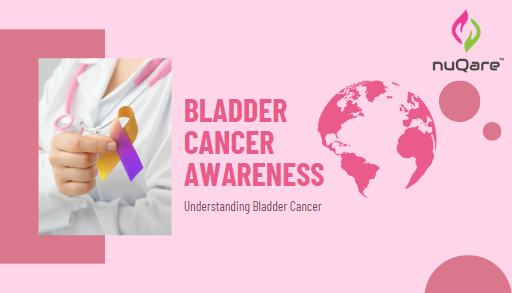In India, the incidence of cancer is escalating at alarming pace therefore it is important to strengthen cancer literacy and knowledge amongst the population.Various types of cancer affects the masses and Bladder cancer is a significant health concern that affects thousands of individuals worldwide. By observing Bladder Cancer Awareness Month in May, we aim to shed light on this disease, raise awareness about its symptoms, and emphasize the importance of prevention. Understanding the signs of bladder cancer and adopting proactive measures can make a difference in early detection and treatment outcomes. In this blog post, we will explore the symptoms associated with bladder cancer and provide practical tips for prevention.

Recognizing Bladder Cancer: Symptoms and Early Signs
Bladder cancer often manifests with specific symptoms that individuals should be aware of. The most common symptom is hematuria, which refers to blood in the urine. If you notice pink, red, or rusty-colored urine, it could be an indicator of bladder cancer. Other signs include frequent urination, a burning sensation during urination, lower back pain, and pelvic discomfort.It is of utmost importance to not disregard these symptoms as they could be indicative of an underlying ailment. If you experience any of these signs, promptly consult with a healthcare professional for further evaluation.
Reducing the Risk: Bladder Cancer Prevention
While some risk factors for bladder cancer, such as age and genetics, are beyond our control, there are steps we can take to reduce the risk:
- Don’t Smoke: Smoking is a leading cause of bladder cancer. If you’re a smoker, quitting is the most effective way to lower your risk. Seek support from smoking cessation programs or healthcare professionals to help you in this journey.
- Stay Hydrated: Drinking an adequate amount of water daily helps dilute potentially harmful substances in the urine and reduces their contact with the bladder lining.
- Eat a Balanced Diet: A healthy diet rich in fruits and vegetables provides essential nutrients and antioxidants that support overall health. Incorporate a variety of colorful produce into your meals.
- Minimise Exposure to Chemicals: Occupational exposure to certain chemicals, such as aromatic amines and polycyclic aromatic hydrocarbons, is linked to an increased risk of bladder cancer. Follow safety guidelines and use protective measures if you work in an environment with potentially harmful substances.
- Be Mindful of Water Sources: In some regions, drinking water may contain contaminants or chemicals. Use water filters or opt for bottled water if you’re concerned about the quality of your tap water.
- By implementing these prevention strategies, you can take proactive steps to reduce the risk of bladder cancer and improve your overall health.
Treatment Options for Bladder Cancer:
Bladder Cancer is a serious disease and it is required to get tested and talk with your Oncologist for your further treatment.The treatment of bladder cancer although depends on various factors such as the stage of cancer, overall health of the patient, and individual preferences. Treatment options may include surgery to remove the tumor or the entire bladder, chemotherapy, radiation therapy, and immunotherapy. Each case requires a personalized treatment plan developed in consultation with healthcare professionals.
Let us bear in mind that by promoting awareness and disseminating knowledge during Bladder Cancer Awareness Month, we can significantly impact the lives of those affected. Together, let us unite in the battle against bladder cancer and lend support to one another in this expedition of prevention, detection, and care.

